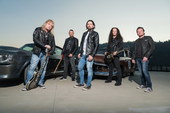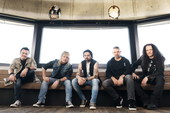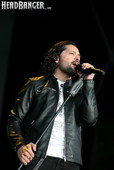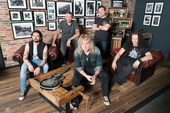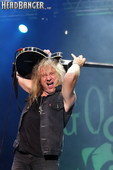Coreleoni
When I’m Busy, I’m Happy
13.11.2019
Àðõèâ èíòåðâüþ | Ðóññêàÿ âåðñèÿSwiss guitarist Leo Leoni is no stranger to our webzine – elsewhere in this section you can find as many as three interviews that he did with us over the past 10 years. However this time we’re presenting him as a mastermind of a different band – apart from his continued duties with Gotthard, he put together a side project wonderfully called Coreleoni, in which he partnered with singer Ronnie Romero of Rainbow to re-record old Gotthard classics and some unreleased tracks. Over two years, Coreleoni have made already two full-length albums, but it’s not only their pace of work that is exciting, it’s also how great Ronnie fits in the shoes of the late great Steve Lee, whom a lot of fans, yours truly included, until recently considered irreplaceable. We were very curious to find more about this new project from Leo himself, but getting hold of him turned out a bit of an adventure. At some point along the chain of communication between the band and eager journalists the country code “41” turned into “14”, which meant we were calling California instead of Switzerland – obviously to no avail. When we finally got the number right a few days later, Leo gave us another surprise by greeting us with Russian “Dobry vecher” (“Good evening”). As long as it was around noon, we had to teach him “Good morning” in Russian on the spot, which he mastered perfectly on the first attempt. Later on the course of this interview we got answers to many of our questions, but where this man gets all this energy and positive vibes still remains a mystery…
Let’s start with a question about Gotthard. The band used to play in Russia regularly with Steve Lee, but with Nic (Maeder, vocals), you only played here once, and it was seven years ago. Why aren’t you coming back? Aren’t you getting any offers from local promoters?
Actually you are supposed to ask local promoters. I wish I could play much more in Russia, but maybe the gig date was no available for whatever reason, maybe Gotthard was already booked for some other festival. Sometimes it’s difficult to get the timing right. I think there could be many reasons. But for sure it’s not because Gotthard don’t wanna play in Russia. We had a good time there.
Now let’s move on to Coreleoni. What happened first – did you get the idea of forming this band and then started looking for a singer, or did you meet Ronnie and then wanted to have a band with him?
No, the story is actually a little bit longer. The Coreleoni story goes back to 1999, which is about 20 years ago. Back then Gotthard did this acoustic album (“D-Frosted”, 1997), and then after the acoustic album and two years on the road, which I was a little bit upset with, because I didn’t want to go that long with the acoustic tour (laughs), we started to have a little bit of problems. There were disagreements over going to more mainstream kind of music. Actually there’s a move called “One Life One Soul”, I don’t know if you’ve ever seen that. It’s an official documentary movie that explains what happened back then and the whole story of Gotthard so far. So I had the idea to start this Coreleoni project, which was about going more to the rock’n’roll vibe which we had on the first three records – “Gotthard” (1992), “Dial Hard” (1994) and “G” (1996). I had to postpone this project, then I had to postpone it again and again, and the last time I wanted to start in was in 2010. It was actually in September 2010, in October Steve left and never came back, so I had to postpone the project again. Then after three records with Nic, Gotthard wanted to do “Defrosted 2”, another acoustic album. Of course, I said, “Well, it’s no problem with me if you wanna do it, but I would like to start this Coreleoni story because I’ve been waiting for it for a long time”. Everybody was aware of what I wanted to do.
Lucky enough, during the “Bang!” tour with Gotthard, we played in Spain, and I met Ronnie there. He was playing with his former band, Lords Of Black. I talked to him after a soundcheck - or after a show, we had two gigs together, I don’t remember exactly. I told him that I was thinking about doing this project, and I asked him if he was interested in participating. I told him, “You would be the perfect singer for it” – his voice was exactly what I was looking for. When I heard him, he was doing “Neon Knights” by Ronnie Dio, and he brought me back 30 years ago - when I started working with Steve, that’s what we wanted to do back then, I mean, the music style, songs like “Firedance”, etc. When I heard Ronnie sing “Neon Knights”, I went to my manager, and then we approached him, “Do you think you can sing ‘Firedance’ with us on stage tonight?” But he didn’t! (laughs) He didn’t know Gotthard really well, he just knew the most popular songs like “Heaven” or “Lift U Up”, he didn’t know the early days of Gotthard, this heavier rock.
When we decided to do “Defrosted 2”, I called Ronnie and said, “Do you remember what we talked about in Spain? I’m starting it. Are you interested?” He said yes, and he flew to Lugano, we recorded “Firedance”, and we got it started. (laughs)
Who came up with the name “Coreleoni”? It’s such a great play on words!
(laughs) Thank you! I like I said, it’s an idea from a long time ago. The “core” is the center of the earth, and when we speak about a human being the center is the heart, and in Italian “cuore” means “heart”. And Leoni is my name. When these two come together, they produce a double meaning, which sounds like mafia, but it is not. (everybody laughs) It’s not mafia, it’s only rock’n’roll, and it’s only my name.
How did you put the rest of the band together? Of course, Hena Habegger is drumming with you in Gotthard, but how did you get Igor Gianola (guitar) and Mila Merker (bass) into Coreleoni?
I’ve known Igor for a long time, we grew up in the same area, so we’ve known each other since we were teenagers, and we jammed together a lot of times. And after touring with Gotthard for “Dial Hard”, he accepted a position in the band U.D.O., the band of former Accept singer Udo Dirkschneider, and he played with them for, I think, nine years. We would always run into each other on the road or at festivals or at home, and say, “Hey, we should do something together again”. It all started with a blind recording – I asked Hena to play drums on “Firedance”, and he didn’t know who the singer was. Then I got Ronnie coming in, he was singing, and I called Igor up and said, “Hey, come up, I wanna show you something”. I played him to the track and said, “Listen, this is my idea. Are you in or not?” (laughs) He loved it, and he said, “Yeah, I will do it”.
I asked Igor if he knew a bass player, who would be a little bit of hardcore, someone between Lemmy and Nikki Sixx, with a little bit of punky character, and a really crunchy distorted sound. Igor said, “I know this guy Mila, maybe we could call him and see what’s going on”. He called Mila, and we had an audition – we went to a practice room and jammed a few songs, and at the end of the first song we were like, “Wow, this is the guy”. It was easy! Everybody was on the same track and in the same direction, and when we are all together, we have a nice good energy. We are having fun, and we are making music that everybody in the band likes.
Some of the songs on both Coreleoni albums are the songs that Gotthard haven’t played for ages – songs like “Firedance” or “Angel”. But some others like “Anytime Anywhere” are the songs that Gotthard plays at every show. How did you pick up the songs for re-recording? Was there any concept?
It's not really a concept, these are the songs that started coming to my mind and to the other guys’ mind. Yes, “Anytime Anywhere” is the song that we play with Gotthard, but one of the reasons why we played “Anytime Anywhere” is that we had a Spanish version of it, which is called “El Traidor”, that we recorded with Gotthard back then, and Ronnie’s mother language is Spanish. I thought it would be nice to hear his voice in Spanish in this track. Also “El Traidor” is a song with a double joke, “el traidor” is somebody who betrayed somebody else, it’s “Betrayer”. Again, this was just a funny thing, “Hey, let’s do this, it’s like Leo’s going out with a new girlfriend, he’s betraying”. (laughs) And the other songs are classics, they are from those records, “Mountain Mama” is from “Dial Hard”, and of course, we play it with Gotthard, because it’s a classic. But like I said, we just picked songs that people want to hear and that fit the setlist and that we like to play.
One of the songs you did on “Coreleoni II”, “And Then Goodbye”, is one of our all-time Gotthard favorites, but, in our opinion, it is very underestimated by fans. Are you personally able to see in advance if something you have just written will be a big hit when it is released?
I don’t know if you could see it, but you could feel that maybe some tracks are more… how can I say it… accessible to many people, and some other songs are maybe a little bit too deep. People nowadays don’t spend much time to figure out what the meaning of a song is about. Sadly enough, music is just a consumer thing, people are like, “like it – next!”, “don’t like it – next!”, but they don’t go really deep. There are many songs out there, both Gotthard and non-Gotthard songs, which are badly underestimated. Everywhere in the world there are great artists coming up with great music and great lyrics, and don’t really make it the way they’re supposed to, they don’t have the success they deserve. I’m really happy that you liked the song, we have two versions of it on “Coreleoni II”, and it’s a very important song that I wrote back then. Sometimes if you’ve grown in Europe, you’re not using “I love you” that much – unlike in America, where they go like, “I love you, I love you”, but the meaning is a little bit different. When we grew up, the words “I love you” were very important, and because they are so important, you may often be scared or you forget to say these words, to show your feelings to your beloved ones whoever they are going to be – your girlfriend, your wife, your kid or whatever. And then shit happens, and there’s no chance to say “I love you” and show your feelings anymore. This is exactly what the song is all about, and I’m very happy I wrote it. A lot of fans have told me that they like it, as you do, and say “thank you”, because after hearing it they went to their beloved ones and let their feelings out. That’s a very nice thing. And I like this song a lot too. That’s why we put two versions on it, there’s a version with piano and vocals only, it’s a bonus track on the Japanese version, and it’s an unbelievable performance.
Where do the new Coreleoni songs come from – are they unused outtakes from the old days, or are they completely new?
They are the songs I co-wrote with Steve, but they were not finished, because they would not fit the Gotthard program at that moment, so they were left aside and never finished. When the Coreleoni project started, I pulled out all those songs and said, “Hey, what do you think of this song? What do you think about those two songs?” People from the band liked it and said, “Let’s go for it”. We finished up the songs, we recorded them, and here they are. Finally they found the light, and what’s more important, they found the hearts and ears of the fans.
How did you get to cover John Lee Hooker? Why this particular artist, and why this particular track (“Boom Boom”)?
(laughs) Well, John Lee Hooker - everybody knows that rock is coming from the blues, it’s roots are in the blues, and as a guitar player, either you like the blues or you don’t, either you have the blues or you don’t. I have the blues sometimes (laughs), which is a feeling that you have. When you grow up, you listen to blues music, and you learn to play guitar by those great records made by those bluesmen. Of course, John Lee Hooker, is one of them! What I like about this song is that it’s a blues song by a bluesman, but it’s a happy song. There’s this man who has fallen in love with his lady, and she’s walking up and down the stairs shaking her butt, you know. (everybody laughs) I think it’s funny, and it’s the essence of rock’n’roll – having fun, flirting and rocking and rolling. I love this idea. Actually there are many artists who have covered this song and played this song live, and every artist did it in a different way. Even John Lee Hooker – you don’t find two versions of the songs by John Lee Hooker which are the same. I thought, “Oh, that’s really interesting!” Then there’s another great guitar player who is not with us any more, Gary Moore, he is one of my all-time favorite guitar players, and when I started to play guitar, I was listening a lot to Gary Moore. When he came out with blues albums, his blues period, I thought it was massive, I liked it a lot, because he put so much energy into those blues tracks that he recorded. I thought it was a cool idea to have this song, “Boom Boom”, and get a similar energy to what Gary Moore had in his blues period. That’s the reason why our version of “Boom Boom” is very energetic. And funny. And obscene, which is funny even more! (everybody laughs)
With Gotthard you did a couple of songs with Spanish lyrics. You mentioned “El Traidor”, and there’s another one called “Tu Pasion”. Have you considered translating any more old songs into Spanish, as Ronnie, as you said, is a native Spanish speaker?
I don’t know, you’ll have to check with him. I would love to, because… It actually would be great to have in every country a song… I mean, it would be nice to have a song in different languages so that you could really explain what the song is all about. Imagine to have one of our songs in Russian – that would be supercool! I need to translate it and try to make it sound correct, but that’s a different story.
Coreleoni have done quite many videos already – two for the new album and three or four for the first one. What is your favorite one, and were there any funny or interesting moments on the filming set?
I think the most important and funniest thing is not even a videoclip, but a teaser, where everybody is changing instruments. That’s very funny, because at the end of the session we said, “Hey, here are instruments, let’s take them and pretend we’re playing songs”. It’s nice. Ronnie and Nic, they’re taking care of all this video work and doing an amazing job, this is very important. In today’s world videoclips are very important, right? Everything is on those iPhones, iPads, computers, that’s the way people consume music nowadays, so I think you have to find a new way of presenting music, and videos is one of them.
What kind of audience do you have at your shows in Switzerland and all over Europe? We assume that there are like three generations of rock fans coming to see you…
Soon there’s gonna be four generations, not just three! (everybody laughs) Yeah, there’s a lot of generations. Early-day Gotthard fans are coming back, because a lot of fans were waiting for this Coreleoni story to start, because, as I said, a lot of these songs we haven’t played with Gotthard for many years, since Steve was around. I would say three generations is correct. Maybe a little fewer mainstream fans, who prefer ballads and a poppier style, but more hardcore fans, I would say, who are having fun and joining the party. They are not scared, they don’t get hurt if the guitar is a little bit louder. (everybody laughs)
What future plans do you have for Coreleoni? Shall we expect an album of new material next?
Well, never say never. Who knows? Every time we meet each other, there’s a nice vibe, a nice energy, a lot of excitement everywhere. I guess something is gonna happen soon. One of these days we’re gonna start writing together and.. let’s see! I’m looking forward to doing something, it’s great to work with everybody, and time will tell what’s gonna happen. We take it step by step – it started as a project, as an idea, and now we’re on record two ready to go out on tour again. We’re having a lot of gigs in November and December, there’s excitement, and excitement brings the next question – what are we gonna do after that?
For “Coreleoni II” you switched labels from Frontiers to AFM, and with Gotthard you recently moved back to Nuclear Blast. What is the role of a label in the band’s life nowadays? How much has it changed since the 90s?
There’s a big change, and it does not concern only labels, but all the music industry changed a lot. As you know, you don’t see that many records anymore, and that means that a lot of other jobs are gone – from studio engineers who are doing recordings to journalists who are doing interviews. And there are fewer and fewer labels around, and there are fewer and fewer music stores, too. Everything has really changed. Now everybody is trying to make the best out of it and see what the best possible combination could be for both sides, for the label and for the artist and for everybody. It’s tricky actually. Now you have this Internet that is taking working places away, and in one way it’s great for music, because your music can be listened to everywhere in the world, and in the other way musicians don’t get the correct value for the music they’re doing. And it’s not only musicians, it’s a lot of other people working in this sector. No music store – no cashier, and no postman that is gonna deliver a package of CDs or records; there’s a lot of jobs that are gone - from printing to designing cover artworks. That’s why everybody is trying to get the best out of this little music market that still exists. Hopefully there’s gonna be good news soon that they’ve found the right way to bring back the real value of music to the musician and everybody else who is around this music world – via the Internet, Spotify or whatever it’s gonna be. This is what we’re looking forward to get, otherwise for the next generation of music, no matter what genre or what kind of music it is, is gonna become poorer and poorer. No food – no belly! (laughs)
With both of your bands very active, do you still have time for your restaurant that you have back home in Switzerland?
(laughs) That’s the reason…I try to stay busy, I try to save energy for good things. Music is a good thing, but my family is also a big part, they are people who support me in what I’m doing. They see that when I’m busy I’m happy, and when I’m not busy I’m not happy. I’d rather keep myself busy and be happy and then everybody around me is happy. I try to take the time for everybody when it’s possible, but sometimes I forget to take time for myself, that’s sometimes my problem. (laughs)
We have one last question left. We started the interview with Gotthard, so let’s finish it with Gotthard. We hear that the band is in the studio recording a new album – is that correct?
Yeah, it is correct. We are in the middle of the production of a new rock’n’roll record, which is hopefully gonna come out around February or March next year. Then we’re gonna start touring in March-April. Yeah-yeah, two trains are rolling in the same period of time. A lot of work, a lot of things to keep me busy, as I said. More or less everything is under control.
Coreleoni on the Internet: http://www.coreleoni.com/
Special thanks to Irina Ivanova (AFM Records) for arranging this interview
Interview by Roman Patrashov, Natalia “Snakeheart” Patrashova
Live photos by Natalia “Snakeheart” Patrashova
Promo photos courtesy of AFM Records
October 5, 2019
© HeadBanger.ru
